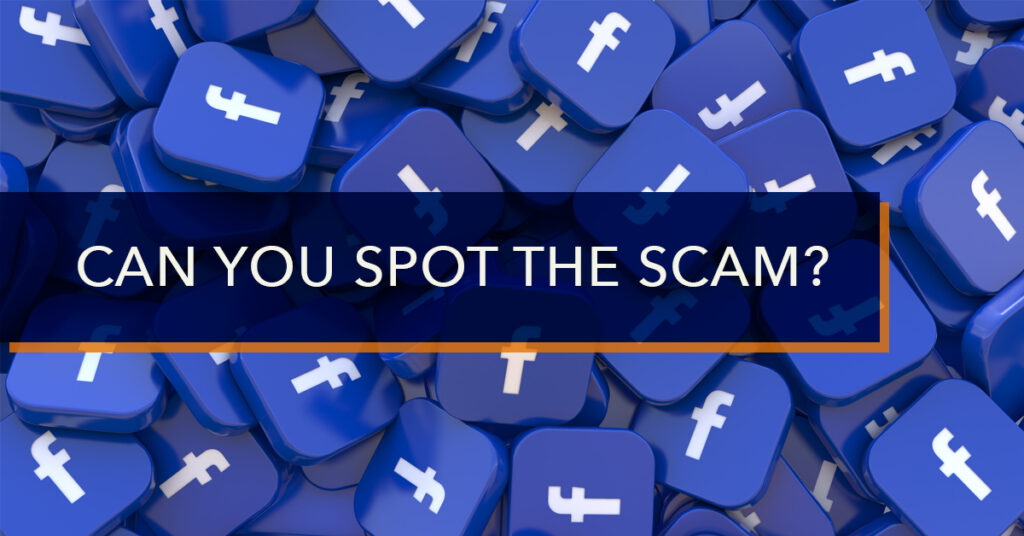
As a business owner, you’re keenly aware of many types of online scams. There’s the call from a female voice claiming your Google listing has been suspended or is incomplete – and you know for a fact that the team at Dashboard just updated it. Or the emails that pretend to be a copy of an invoice for some large purchase you didn’t make – and that conveniently include a PayPal link so you can log in and check your account (never click them – it’s a phishing scheme to steal your password). We could go on and on, but you get the idea. Scammers are everywhere, and you must stay one step ahead of them to safeguard your data, privacy, and credit information.
Here, we share details of two common scams that seem to be prevalent right now: The Facebook Copyright Violation Scam and the “Lost Dog” Scam. Once you have the facts, you should be able to avoid these scams and the damage they can do to both your business presence and your reputation.
Facebook Scam: The Facebook Copyright Violation Scam
There’s a new scam that’s appeared recently on Facebook. It’s especially prevalent on Facebook business pages and many page admins are seeing dozens a day. In this scam, someone pretending to be from Facebook or Meta, the parent company of both Facebook and Instagram, messages the page administrator claiming that a post from the company “violates Meta’s copyright” or “intellectual property” and the post has been removed, your account was shut down, or both. The message goes on to say that if you do not file an appeal within 24 hours, your account will be permanently banned. A helpful link provides what looks like a legitimate web page associated with Meta, the parent company of Facebook.
What’s the Scam?
This is a credential stealing scam. The scammers are trying to trick you into disclosing your personal information, login credentials, and other information. Once disclosed, they lock you out of your own company page and hijack it for their own purposes. All the hard work you’ve put into building up your social media page is gone – and they now have access to your customers and can communicate as if they were you, to everyone following your page.
Why Do People Fall for the Facebook Copyright Scam?
Scammers use this message to tap into several subconscious pathways of the users’ brain at once. First, there is the overall (and quite true) feeling that Facebook’s automatic ‘fact checking’ bot is terrible; it flags words and phrases incorrectly as hate speech and leaves actual hate speech online, for example. Many users have had posts removed or found their accounts frozen for days at a time because a bot decided that using the words “killing” in a post meant you were an antisocial threat to society when you were just talking about killing a spider in the kitchen.
Secondly, scammers know that many small-business owners rely—to an unhealthy extent—on their Facebook pages as either their primary web presence or for communicating with their customers. The thought of losing access is painful and frightening, and the fear helps scammers bypass the logical parts of the brain that should be saying, “Wait a minute. What post? I only post pictures I take, of the things I sell, and I write my own posts, so there’s no way this can be true…”
Lastly, several telltale signs abound in the post indicating it’s a sham and a scam. The “profile” of the person messaging you has a false name: Meta Customer Support, Susan Support, Sam Support, or some variation of this is common, but also various other names – and never a photo, just an icon taken from a stock photo site of a person with a headset on or a legitimate-looking Meta logo.
And even though the link looks legit, clicking it leads to a credential-stealing website whose sole purpose is to trick you into typing in your username, password, recovery code, or two-factor authentication code so the hackers can hijack your page, lock you out, and reach the thousands of customers you’ve worked so hard to attract to your page over the years. Worse still, they can use your admin credentials for your page to begin gaining access to your personal profile on FB/IG, your ad accounts—including billing information—and begin to rack up charges on your account for ads having nothing to do with your Business Page.
The Lost Dog Scam
There’s a second Facebook scam that still shows up on every business and personal page at least once: the lost/injured dog picture, followed by a short frantic post and the request to “Bump this post” or “Share please!”
What’s the Scam?
Sharing posts is part of the fun on Facebook, and as a business owner, of course you want your customers to share your posts to magnify their reach. Scammers know this. They tap into your empathy and care by showing a sad or injured dog and an urgent message for help.
But what happens if you share the picture? Nothing for an hour or a day. Then the scammers change the original message and picture to one of their choosing. Typically, it is some type of money scam or promise of money. But it may also be an advertisement for a product.
By getting people to share the original post and then changing the original post, the scammers have magnified their reach exponentially. Now, they have thousands and thousands of people looking at their ad for a bogus government loan or overpriced knock-off watches simply by stealing a picture of a dog, claiming it is lost, and tapping into people’s natural urge to help.
Why Do People Fall for the Lost/Injured Dog Scam?
Scammers choose the saddest picture of a lost or injured dog they can find. It looks like a family pet. Immediately, your subconscious clicks into gear, making connections to your own beloved furry family member.
“If that were my dog, I’d want it found” or “If our dog ever got out of the yard and hit by a car, my kids would be inconsolable. I’d want someone to share the post, too.”
Sharing the post also takes little effort on your part. It’s a split-second decision. You’re scrolling Facebook, sipping your morning coffee, and you see the sad dog and the accompanying post, and you click “share” without a second thought. Mission accomplished – for the scammers.
How can you tell the lost or injured pooch isn’t real? First, look for the phone number and name of the person claiming they found the dog. The scam posts never list an actual name or phone number. They also list where the animal was found, the block or street and the town, and where it is currently located. If none of these are included in the listing, chances are good it is a scam.
Lastly, “Bump this post!” and “Please share!” without the information cited above is the last and most telling sign of a scam post. “Bump” means post it prominently so it’s at the top of the feed and “share” of course means to share publicly.
You shared the post because you’re a caring, decent human being who immediately thought about their own beloved pets and wanted to help. But unfortunately, you’ve just used your page or social media presence to allow scammers into the feed of your friends and customers. Now, they will post their own scam, reaching a wider audience than they could on their own. Be smart and don’t share the lost dog post (unless it’s in your neighborhood and you have contact information!)
Stay Safe on Facebook
By the time we publish this article, there will probably be three more scams and more in the pipeline. Don’t you wish crooks would use their creativity and intelligence to solve problems instead of creating them?
Stay safe on Facebook. As a business owner, make sure you have a business account set up properly and assign admins and managers from there rather than directly from the business page. Designate someone else you trust from your company as a backup person who can monitor your account. Set up two-factor authentication so that if someone tries to sign into your account but does not have access to your mobile phone, they won’t be able to get in. Change your passwords frequently, and do not reuse the password on multiple accounts.
Most importantly, don’t fall for Facebook scams. Don’t click on links in random messages, even if they look legitimate. Don’t share things without reading them thoroughly. Criminals want to steal your money, your credentials, and your customers. Be as mindful about your digital credentials as you are about your purse or wallet when you are out shopping.
Dashboard Interactive Social Media Support
Dashboard Interactive offers small- and medium-sized business owners full social media support. From planning your campaign to managing advertising, we can help you maximize Facebook, Instagram, and many other social media platforms. Call us at 763-242-2454.

